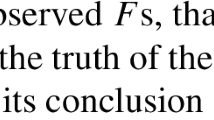Abstract
Many solutions of the Goodman paradox have been proposed but so far no agreement has been reached about which is the correct solution. However, I will not contribute here to the discussion with a new solution. Rather, I will argue that a solution has been in front of us for more than two hundred years because a careful reading of Hume’s account of inductive inferences shows that, contrary to Goodman’s opinion, it embodies a correct solution of the paradox. Moreover, the account even includes a correct answer to Mill’s question of why in some cases a single instance is sufficient for a complete induction, since Hume gives a well-supported explanation of this reliability phenomenon. The discussion also suggests that Bayesian theory by itself cannot explain this phenomenon. Finally, we will see that Hume’s explanation of the reliability phenomenon is surprisingly similar to the explanation given lately by a number of naturalistic philosophers in their discussion of the Goodman paradox.
Similar content being viewed by others
References
Ackerman R. (1969). ’Sortal predicates and confirmation’. Philosophical Studies 20: 1–4
Carnap R. (1947). ’On the application of inductive logic’. Philosophical and Phenomenological Research 8: 133–147
Catania A.C. (1998). Learning. Upper Saddle River, Prentice Hall
Goodman N. (1965). Fact, Fiction and Forecast. Indianapolis, Bobbs-Merrill
Goodman N. (1972). Problems and Projects. Indianapolis, Bobbs-Merrill
Harman G. (1994). ’Simplicity as a Pragmatic Criterion for Deciding what Hypotheses to take Seriously’. In: Stalker, D. (eds) Grue!, pp 153–171. Open Court, Chicago
Hempel C.G. (1965). Aspects of Scientific Explanation. Free Press, New York
Hetherington S. (2001). ’Why there need not be any Grue problem about inductive inference as such’. Philosophy 76: 127–136
Hume D. (1748). An Enquiry Concerning Human Understanding. Clarendon Press, Oxford
Konyndyk K. (1980). Solving Goodman’s paradox: A reply to Stemmer. Philosophical Studies 37: 297–305
Lange M. (1994). ’Earman on the Projectibility of Grue’. In: Hull, D., Forbes, M. and Burian, R.M. (eds) PSA 1994, vol 1, pp 87–95. East Lansing, Philosophy of Science Association
Mill J.S. (1895). A System of Logic. Harper and Brothers, New York
Okasha S. (2001). What did Hume really show about induction?. The Philosophical Quarterly 51: 307–327
Peirce C.S. (1878/1957): ’The Order of Nature’, in V. Thomas (Ed.) Essays in the Philosophy of Science. Indianapolis: Bobbs-Merrill, pp. 105–125.
Quine W.V. (1960). Word and Object. MIT Press, MA, Cambridge
Quine W.V. (1969). ’Natural kinds’. In: Quine, W.V. (eds) Ontological Relativity and other Essays, pp 114–138. Columbia University Press, New York
Quine W.V. (1974). The Roots of Reference. IL, Open Court, La Salle
Quine W.V. (1975). ’Mind and Verbal Dispositions’. In: Guttenplan, S. (eds) Mind and Language, pp 83–95. Clarendon Press, Oxford
Quine W.V. (1996). ’Progress on Two Fronts’. The Journal of Philosophy 93: 159–163
Quine W.V. and Ullian J.S. (1970). ’The Web of Belief’. Random House, New York
Sanford D.H. (1994). ’A Grue Thought in a Bleen Shade: ’Grue’ as a Disjunctive Predicate,’. In: Stalker, D. (eds) Grue!, pp 173–192. Open Court, Chicago
Stalker D. (1994). Grue!. Open Court, Chicago
Stemmer N. (1971). ’Three Problems in Induction’. Synthese 23: 287–308
Stemmer N. (1975). ’A Relative Notion of Natural Generalization’. Philosophy of Science 42: 46–48
Stemmer N. (1978). A Partial Solution to the Goodman Paradox’. Philosophical Studies 34: 177–185
Stemmer N. (1981). ’Generalization classes as alternatives for similarities and some other concepts’. Erkenntnis 16: 73–102
Stemmer N. (1983): The Roots of Knowledge. Oxford, Blackwell (New York: St. Martin’s Press)
Stemmer N. (1988). ’Hume’s Two Assumptions’. Dialectica 42: 93–103
Walker S. (1987). Animal Learning: An Introduction. Routledge & Kegan Paul, London
Author information
Authors and Affiliations
Corresponding author
Rights and permissions
About this article
Cite this article
Stemmer, N. Hume’s Solution of the Goodman Paradox and the Reliability Riddle (Mill’s problem). Philos Stud 132, 137–159 (2007). https://doi.org/10.1007/s11098-004-0017-y
Published:
Issue Date:
DOI: https://doi.org/10.1007/s11098-004-0017-y



